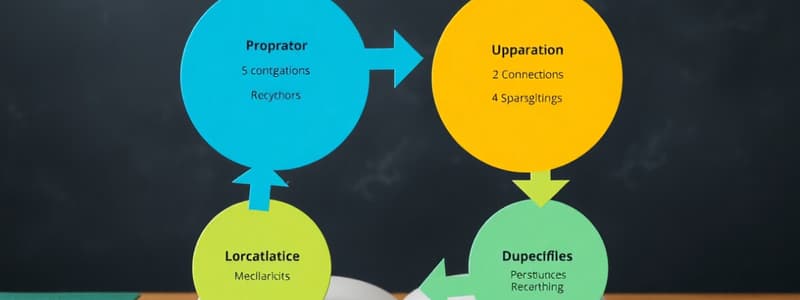Podcast
Questions and Answers
What is the primary characteristic of formal education?
What is the primary characteristic of formal education?
- Self-directed learning from experiences
- Spontaneous learning through workshops
- Structured curriculum led by educators (correct)
- Informal community-based learning
Which level of education focuses on foundational skills in literacy and numeracy?
Which level of education focuses on foundational skills in literacy and numeracy?
- Primary Education (correct)
- Tertiary Education
- Adult Education
- Secondary Education
What type of education is characterized by organized and optional learning outside formal institutions?
What type of education is characterized by organized and optional learning outside formal institutions?
- Formal Education
- Non-Formal Education (correct)
- Informal Education
- Vocational Education
Which educational theory emphasizes learning through experiences and constructing knowledge?
Which educational theory emphasizes learning through experiences and constructing knowledge?
What is a significant challenge in education related to socio-economic factors?
What is a significant challenge in education related to socio-economic factors?
Which current trend in education focuses on integrating diverse perspectives into learning?
Which current trend in education focuses on integrating diverse perspectives into learning?
What is one of the key benefits of education mentioned in the content?
What is one of the key benefits of education mentioned in the content?
Which of the following best describes technology integration in education?
Which of the following best describes technology integration in education?
Flashcards are hidden until you start studying
Study Notes
Definition of Education
- Process of acquiring knowledge, skills, values, and attitudes.
- Can occur formally (schools, colleges) or informally (home, community).
Types of Education
-
Formal Education
- Structured curriculum led by educators.
- Occurs in educational institutions (e.g., schools, universities).
- Usually leads to recognized qualifications.
-
Informal Education
- Unstructured, lifelong learning.
- Social, self-directed learning from experiences.
- Examples: workshops, family teachings, and community involvement.
-
Non-Formal Education
- Organized and optional learning outside formal education.
- Includes adult education, skill development programs, and vocational training.
Levels of Education
- Primary Education: Basic education for children, foundational skills in literacy and numeracy.
- Secondary Education: Middle schooling, preparing students for higher education or vocational training.
- Tertiary Education: Advanced learning at universities or colleges, leading to degrees or professional qualifications.
- Adult Education: Learning opportunities for adults, often focusing on skills and personal development.
Importance of Education
- Promotes personal development and critical thinking.
- Essential for economic growth and workforce development.
- Contributes to social equality and informed citizenship.
- Fosters cultural awareness and social cohesion.
Educational Theories
- Behaviorism: Emphasis on observable behaviors and the role of reinforcement.
- Constructivism: Learning as an active process where learners construct knowledge based on experiences.
- Humanism: Focus on personal growth and self-actualization as essential to learning.
Current Trends in Education
- Technology Integration: Use of digital tools and online resources (e-learning, virtual classrooms).
- Inclusive Education: Policies and practices to accommodate diverse learners, including those with disabilities.
- Global Education: Emphasis on international perspectives and multicultural education.
Challenges in Education
- Access and equity: Disparities in educational opportunities based on socio-economic status.
- Quality of education: Variability in teaching standards and resources.
- Exam pressure and mental health: Impact of standardized testing on students’ well-being.
Future Directions
- Emphasis on lifelong learning and adaptability.
- Increased focus on STEM (Science, Technology, Engineering, Mathematics) education.
- Importance of social-emotional learning in curricula.
Definition of Education
- Education is a multifaceted process encompassing the acquisition of knowledge, skills, values, and attitudes
- It can occur in both structured (formal) settings like schools and colleges and informal settings such as homes and communities
Types of Education
- Formal education is structured, led by educators, and usually results in recognized qualifications
- Informal education is lifelong, unstructured, and involves social or self-directed learning from experiences
- Non-formal education refers to organized and optional learning outside of formal education, including adult education, skill development programs, and vocational training
Levels of Education
- Primary education provides foundational skills in literacy and numeracy for children
- Secondary education prepares students for higher education or vocational training
- Tertiary education offers advanced learning at universities or colleges, leading to degrees or professional qualifications
- Adult education provides learning opportunities for adults, often focusing on skills and personal development
Importance of Education
- Education promotes personal development and critical thinking skills
- It is essential for economic growth and workforce development
- Education contributes to social equality and informed citizenship
- It fosters cultural awareness and social cohesion
Educational Theories
- Behaviorism emphasizes observable behaviors and the role of reinforcement in learning
- Constructivism views learning as an active process where learners construct knowledge based on their experiences
- Humanism focuses on personal growth and self-actualization as essential to the learning process
Current Trends in Education
- Technology integration is becoming increasingly prevalent, with the use of digital tools and online resources for learning
- Inclusive education prioritizes accommodating diverse learners, including those with disabilities
- Global education emphasizes international perspectives and multicultural education
Challenges in Education
- Access and equity remain significant challenges, with disparities in educational opportunities based on socio-economic status
- Quality of education varies widely, with differences in teaching standards and available resources
- Exam pressure and its impact on students' mental health are growing concerns
Future Directions
- Lifelong learning and adaptability are increasingly emphasized in education
- There is a growing focus on STEM (Science, Technology, Engineering, Mathematics) education
- The importance of social-emotional learning is gaining recognition in curricula
Studying That Suits You
Use AI to generate personalized quizzes and flashcards to suit your learning preferences.




